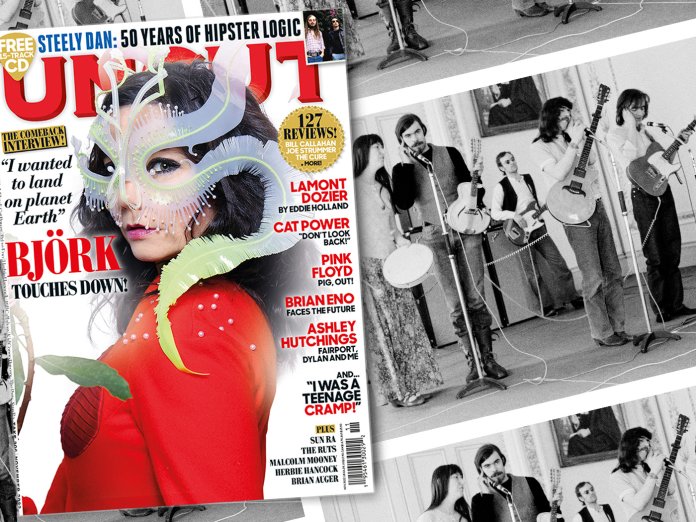The guv’nor of three key folk-rock groups guides us through his highlights in the latest issue of Uncut magazine – in UK shops from Thursday, Sept 15 and available to buy from our online store. “Bob Dylan told me he found a copy of my album Rattlebone & Ploughjack at a yard sale recent...
The guv’nor of three key folk-rock groups guides us through his highlights in the latest issue of Uncut magazine – in UK shops from Thursday, Sept 15 and available to buy from our online store.
“Bob Dylan told me he found a copy of my album Rattlebone & Ploughjack at a yard sale recently,” says an incredulous Ashley Hutchings. “Can you imagine Bob walking around a car boot sale? Of all the albums, he found that!”
Decades after covering some of his unreleased songs with Fairport Convention, the bassist and bandleader is now a bona fide pen pal of Dylan’s. “He refers to me as ‘Million Dollar Ash’, and he signs his letters ‘your pal, Bob’. That’ll do me fine. I’m very proud of getting an MBE for services to music, but Bob writing to me means more.”
In celebration of his 100th record release, Hutchings is taking Uncut through some of the finest albums of his long career, from landmark Fairport and Steeleye Span albums to the present day. What really fires Hutchings up at the moment, though, is his new podcast, The Guv’nor, featuring the bassist in conversation with his son Blair Dunlop. “I’ve never done anything like it before, but it’s just clicked. Blair’s a great foil for me. I think you’ll be entertained!”
FAIRPORT CONVENTION
WHAT WE DID ON OUR HOLIDAYS
ISLAND, 1969
Leaps and bounds: Fairport’s second, introducing Sandy Denny, and a series of deathless songs such as “Meet On The Ledge”
We were so young when we made our first album in 1967, and we’d never been in the studio before. Consequently, it’s a bit of a mess, but it was a great stepping stone to this one. Sandy had just joined us and that was very, very special. Suddenly, we were getting great vocal takes and not having to do 10 takes on each. There was a lot of writing going on – Richard and Sandy were quite clearly the best writers, so we left most of it to them.
I remember first hearing Sandy play and sing “Fotheringay” – she was magnetic, and a very good guitarist as well. We loved it. I wrote “Mr Lacey”: he was a neighbour of mine in Muswell Hill, he’d been on the radio, kind of an extra Goon, and he had an incredible house, filled with robots he’d built. I’d written this blues and I said to the band, “Can we get him in the studio with one of his machines?” So he turned up with this walking robot which moved around the studio as it was recorded. This was Fairport in the early days – there was always a wacky sense of humour. At our gigs there were always weird things happening, like Sandy trying to tell a joke and forgetting the punchline.
FAIRPORT CONVENTION
LIEGE & LIEF
ISLAND, 1969
The folk-rock blueprint, conceived in rural seclusion after the band’s tragic van accident
The crash was in the national newspapers. People were very supportive – The Rolling Stones sent a lovely message. I was in hospital, out of it, for some months. I had a lot of facial injuries – Iain Matthews fainted on the bed next to me when he saw my face. We had a get-together at a flat in west London; the first decision we had to make was, “Are we going to carry on?” Then it was, “Well, what are we gonna play?” I think I probably proposed that we carried on with the traditional material we’d started properly with “A Sailor’s Life”. We were all behind it, we got [fiddler] Dave Swarbrick in and Dave Mattacks on drums, who didn’t know anything about folk music. Joe Boyd was wonderful and set us up in a house in the countryside in Hampshire, and that was where the magic happened.
The material was brought in by Sandy, Swarbrick and me – I was going up to London, finding things in Cecil Sharp House – and Richard started writing in Hampshire, “Crazy Man Michael”, of course, and “Farewell Farewell”. We set up all the instruments in a big room and they stood there for the whole time we were there. We would just come down in the morning and one by one go into the room and start working on the material. It wasn’t easy, because we were doing things that hadn’t been done before – you know, “What drum pattern do you play to that?” We literally invented what to do. I remember seeing the original broadsheet for “The Deserter” on the floor in front of Sandy so she could read the words. She was just great, the best folk-rock singer ever for me, because she had folk and she had rock in her blood, and she had soul. As much as I love, say, June Tabor or Maddy Prior, they didn’t have the rock side as well as the folk.
People think I left before the album came out because I wanted to form Steeleye Span and that Sandy left because she wanted to be with Trevor [Lucas] and do her own thing. But it’s not as simple as that. I think in our heads we were all over the place – we were still getting over the crash, I know I was. We knew Liege… was a great album, and we should have stayed, actually. But Joe, bless him, wasn’t strong enough to say, “Listen, stop fucking about, just stay and make it work. You’ve started something off here.” But at least it meant that there were three good bands instead.
PICK UP THE NEW ISSUE OF UNCUT TO READ THE FULL STORY



